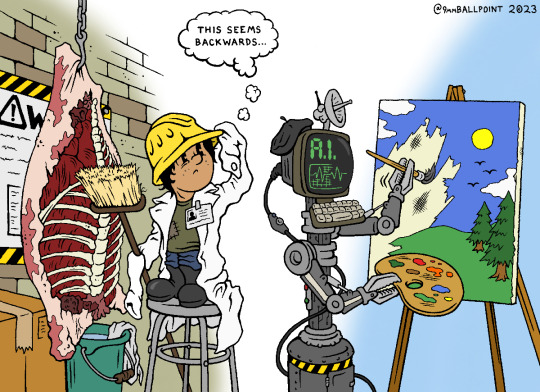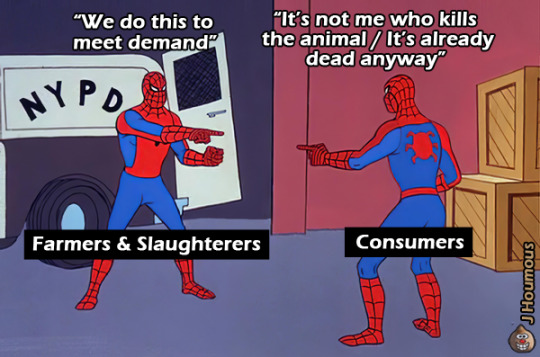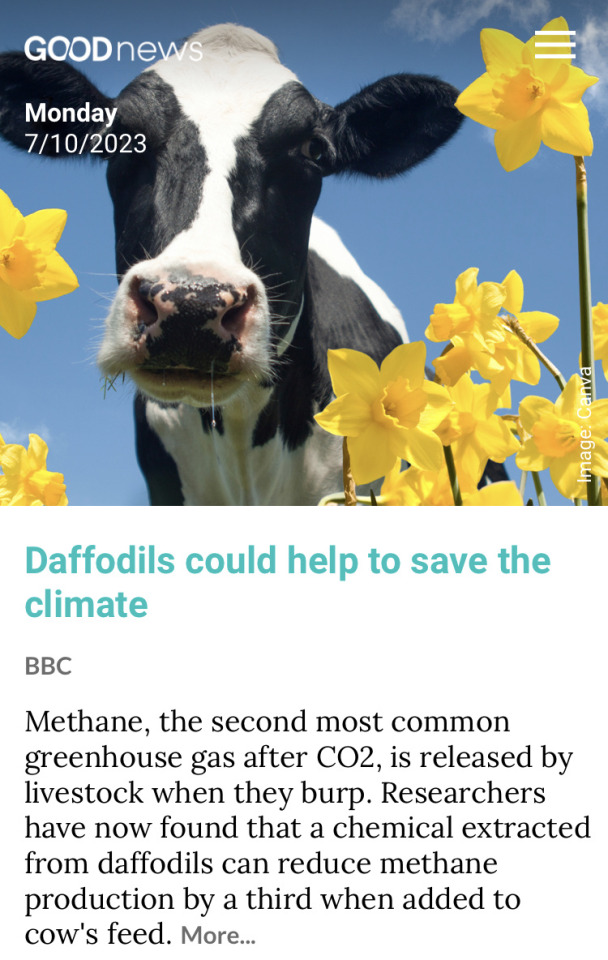#Meat Industry
Explore tagged Tumblr posts
Photo

I'm not anti-technology, I just think there's something deeply sick about a society where robots make art and children work in factories.
54K notes
·
View notes
Text
An American cattle rancher exposing why the beef sold in american grocery stores doesn’t look like natural beef.
The gasses pumped into American grocery store meat are a mixture of carbon dioxide, oxygen, and carbon monoxide. Carbon monoxide binds with myoglobin in the meat, which keeps the meat looking bright red for weeks.
Other countries have banned using carbon monoxide on meat. 🤔
#pay attention#educate yourselves#educate yourself#reeducate yourselves#knowledge is power#reeducate yourself#think about it#think for yourselves#think for yourself#do your homework#do research#do some research#do your own research#ask yourself questions#question everything#food supply#meat#toxic food#poison#government corruption#evil lives here#news#truth be told#meat industry
269 notes
·
View notes
Text
Tumblr, I promise you that animal agriculture does not need you licking their boots.
#vegan#animal rights#animal agriculture#meat#dairy#eggs#meat industry#dairy industry#egg industry#veganism#go vegan#vegetarian#social justice#human rights#climate change#environmentalism#capitalism#classism#bootlicking#leftism#progressive#progressivism#me#personal#thatveganwhiterose#rant#vent
219 notes
·
View notes
Text

Cognitive dissonance
#veganhumor#vegan humor#veganmeme#vegan meme#veganmemes#vegan memes#veganhumour#veganjoke#veganjokes#vegan#veganism#ethicalliving#ethics#animalrights#animal liberation#meatless#no meat#meat is murder#meat industry#govegan#go vegan#veganfortheanimals#jhoumous#jhummus#jhumus
41 notes
·
View notes
Text
It's so weird how meat-forward American food culture is that Americans who don't eat meat every day will say to me "yeah I'm basically vegetarian I don't eat meat *every* day" like????? Please I'm begging you to consider other forms of protein the human body is not meant to only eat meat, we are omnivores.
Like. It was honestly pretty easy for me to switch to a vegetarian diet because I grew up in a kosher household and kosher meat is *expensive* so we only had meat on Shabbat (once a week). But then I'll talk to other Americans and they'll talk about eating meat every day and I'm like??? How???
I think humans are meant to eat meat and I think expecting everyone to give it up is wrong, but c'mon this is not sustainable you do not need to be eating meat every single day.
Why is America so meat obsessed?????
#food anthropology#food production#american food culture#meat industry#if I had the time I'd answer my question and the answer would be the legacy of colonialism and displacing indigenous#to make way for cattle pastures
64 notes
·
View notes
Text

#meat industry#animal agriculture#go vegan#veganism#animal cruelty#eating animals#animal suffering#animal slaughter#animal rights#vegan#meat is murder#eating meat#farmed animals
22 notes
·
View notes
Text
I’m not indigenous so maybe I’ve gotten this wrong but I feel like there’s a certain disrespect for indigenous practices amongst vegans. I often see statements that equates to “everyone who eats meat is evil and hates animals”. But there are indigenous communities who have kept animals and hunted for centuries and still do it sustainably today. And so it just rubs me the wrong way when some vegans equates eating meat to a moral failure, and rarely talk about the huge problems within the modern western meat industry instead.
#there are other reasons for why I don’t like the narrative of non-vegans being evil as well but that’s a bit besides the point#climate justice#veganism#vegan#meat#indigineous people#meat industry#sustainability
15 notes
·
View notes
Text
btw you're so much stronger than most people for actively resisting a system that practically forces you to exploit and kill animals. they are the snowflake for not being able to keep their shit together any time someone points out the ethical issue of what they're eating and partaking in. they are the snowflake for not being able to handle your badass morals. you're doing good for many lives and you’re doing an amazing job. xx. 🌱
#vegan#go vegan#veganism#animal rights#animal rights activist#meat industry#meat is murder#dairy industry#factory farms#vegetarian#activist#activism
11 notes
·
View notes
Text
Yes, Why?

#vegan#vegetarian#veganism#vegan food#non-vegan#where does my food come from#where does your food come from#processed foods#meat industry#meat#where does meat come from#vegan memes#vegan meme
17 notes
·
View notes
Text
Did you know?
That you can be an animal rights activist without being vegan or vegetarian?
That you can believe that the cruelty towards animals in the meat industry is unjust without believing everyone in the world should be vegan/vegetarian?
That you can believe that there are far better, more humane and merciful ways to slaughter livestock than what we currently do without being vegan?
That you can believe that the conditions and environments of animals, farm or pets or wild, should be a priority amongst people without being vegan or vegetarian?
That you can have strong opinions on animal cruelty without being vegan or vegetarian?
That you can be vegan without trying to force everyone else to also be vegan?
(Kudos to thoes who do. Love u)
That you can believe all life, from insects to trees, from land and sea, should be treated with respect- while still also acknowledging that no one is ever going to stop eating meat?
That people are vegans for alot of reasons, and not always, if not rarely, for protest or performative reasons?
#vegan#veganism#vegetarian#animal rights#lgbt#lgbtq#human rights#activist#leftist#socialism#meat eaters#herbivore#animals#animal life#life#respect#meat industry#farm to table#politics#environment#environmental health#environmentalism
17 notes
·
View notes
Text

#i’ve heard this and seaweed/kelp? i think#but also we need to have beef alternatives and just eat less meat in general#but every bit helps#good news#animals#science#meat eating#climate change#meat industry#environmentalism#environment#methane#greenhouse gases#greenhouse gas reduction
58 notes
·
View notes
Text
Image found on Pinterest.

11 notes
·
View notes
Link
The water supply that 40 million Americans rely on has been pushed to its limit. Reservoirs and wells are running low. This week, the states that rely on water from the Colorado River reached a temporary deal with the Biden administration on sharing what’s left.What’s using all that water?
The majority [56%] of the water in the Colorado River basin — more than one trillion gallons — is used to grow feed for livestock, connecting the region’s water crisis to how much dairy and meat we eat.
The crops grown for humans to eat directly, like vegetables, use up less than a quarter of the amount of water that livestock feed does. And residential consumption, like watering your lawn and taking showers, uses a fifth of what livestock feed does.
No paywall: https://web.archive.org/web/20230522173625/https://www.nytimes.com/interactive/2023/05/22/climate/colorado-river-water.html
85 notes
·
View notes
Text
Excerpt from this New York Times story:
While many people can conjure up romantic visions of a Montana ranch — vast valleys, cold streams, snow-capped mountains — few understand what happens when the cattle leave those pastures. Most of them, it turns out, don’t stay in Montana.
Even here, in a state with nearly twice as many cows as people, only around 1 percent of the beef purchased by Montana households is raised and processed locally, according to estimates from Highland Economics, a consulting firm. As is true in the rest of the country, many Montanans instead eat beef from as far away as Brazil.
Here’s a common fate of a cow that starts out on Montana grass: It will be bought by one of the four dominant meatpackers — JBS, Tyson Foods, Cargill and Marfrig — which process 85 percent of the country’s beef; transported by a company like Sysco or US Foods, distributors with a combined value of over $50 billion; and sold at a Walmart or Costco, which together take in roughly half of America’s food dollars. Any ranchers who want to break out from this system — and, say, sell their beef locally, instead of as anonymous commodities crisscrossing the country — are Davids in a swarm of Goliaths.
“The beef packers have a lot of control,” said Neva Hassanein, a University of Montana professor who studies sustainable food systems. “They tend to influence a tremendous amount throughout the supply chain.” For the nation’s ranchers, whose profits have shrunk over time, she said, “It’s kind of a trap.”
Cole Mannix is trying to escape that trap.
Mr. Mannix, 40, has a tendency to wax philosophical. (He once thought about becoming a Jesuit priest.) Like members of his family have since 1882, he grew up ranching: baling hay, helping to birth calves, guiding cattle into the high country on horseback. He wants to make sure the next generation, the sixth, has the same opportunity.
So, in 2021, Mr. Mannix co-founded Old Salt Co-op, a company that aims to upend the way people buy meat.
While many Montana ranchers sell their calves into the multibillion-dollar industrial machine when they’re less than a year old, never to see or profit from them again, Old Salt’s livestock never leave the company’s hands. The cattle are raised by Old Salt’s four member ranches, slaughtered and processed at its meatpacking facility, and sold through its ranch-to-table restaurants, community events and website. The ranchers, who have ownership in the company, profit at every stage.
The technical term for this approach — in which a company controls various elements of its supply chain — is vertical integration. It’s not something many small meat businesses try, as it requires a huge amount of upfront capital.
“It’s a scary time,” Mr. Mannix said, referring to the company’s sizable debt. “We’re really trying to invent something new.”
But, he added, “No matter how risky it is to start a business like Old Salt, the status quo is riskier.”
11 notes
·
View notes
Text

“We spend billions of dollars to find life on other planets
and trillions of dollars killing life on this one.”
5 notes
·
View notes
Text
I'm genuinely curious about your replies here.
#veganism#meat industry#vegetarian#pescetarian#consumerism#marketing#chicken and egg argument i guess
8 notes
·
View notes